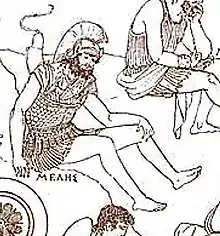Meges
In Greek mythology, Mégês Phyleïdês (Ancient Greek: Μέγης Φυλεΐδης) was the commander of Epeans and/or Dulichians during the Trojan War.

Family
Meges was the son of Phyleus and his mother's name is variously given as either Eustyoche,[1] Ctimene, Timandra,[2] Hagnete, or Ctesimache.[3]
Mythology
Meges was one of the suitors of Helen,[4] and commanded the armies of the Echinadians and the Dulichians during the Trojan War, having summoned forty or sixty ships; he also led a contingent of Epeans who had once migrated to Dulichium together with his father.[3][5]
Meges was credited with killing a number of opponents, including Pedaeus (a son of Antenor),[6] Croesmus,[7] Amphiclus,[8] Itymoneus, Agelaus,[9] Eurymenes,[10] and Deiopites.[11] Dolops attempted to strike him with a spear but the corselet Meges was wearing, a gift for his father from Euphetes of Ephyra, saved his life.[12] Meges helped Odysseus to collect gifts for Achilles.[13] He was one of the men to enter the Trojan Horse.[14]
According to Dictys Cretensis, Meges fell at Troy.[15] Pausanias mentions a painting of him wounded in the arm by a Trojan, Admetes the son of Augeas.[16] Tzetzes relates that Meges, along with Prothous and a number of others, perished at Euboea.[17]
Notes
- Hyginus, Fabulae 97; Homer, Iliad 2.627
- Eustathius on Homer, 305.15
- Tzetzes, Homeric Allegories Prologue 576 - 577
- Apollodorus, 3.10.8
- Homer, Iliad 2.625, 5.69, 13.692 & 15.531; Euripides, Iphigenia in Aulis 284; Hyginus, Fabulae 97
- Homer, Iliad 5.69
- Homer, Iliad 15.523
- Homer, Iliad 16.313
- Quintus Smyrnaeus, 1.279
- Quintus Smyrnaeus, 10.108
- Quintus Smyrnaeus, 13.212
- Homer, Iliad 15.525 ff.
- Homer, Iliad 19.239 ff.
- Quintus Smyrnaeus, 12.326
- Dictys Cretensis, 3.10
- Pausanias, 10.25.5
- Tzetzes on Lycophron, 902
Reference
- Apollodorus, The Library with an English Translation by Sir James George Frazer, F.B.A., F.R.S. in 2 Volumes, Cambridge, MA, Harvard University Press; London, William Heinemann Ltd. 1921. ISBN 0-674-99135-4. Online version at the Perseus Digital Library. Greek text available from the same website.
- Dictys Cretensis, from The Trojan War. The Chronicles of Dictys of Crete and Dares the Phrygian translated by Richard McIlwaine Frazer, Jr. (1931-). Indiana University Press. 1966. Online version at the Topos Text Project.
- Euripides, The Plays of Euripides, translated by E. P. Coleridge. Volume II. London. George Bell and Sons. 1891. Online version at the Perseus Digital Library.
- Euripides, Euripidis Fabulae. vol. 3. Gilbert Murray. Oxford. Clarendon Press, Oxford. 1913. Greek text available at the Perseus Digital Library.
- Gaius Julius Hyginus, Fabulae from The Myths of Hyginus translated and edited by Mary Grant. University of Kansas Publications in Humanistic Studies. Online version at the Topos Text Project.
- Homer, The Iliad with an English Translation by A.T. Murray, Ph.D. in two volumes. Cambridge, MA., Harvard University Press; London, William Heinemann, Ltd. 1924. ISBN 978-0674995796. Online version at the Perseus Digital Library.
- Homer, Homeri Opera in five volumes. Oxford, Oxford University Press. 1920. ISBN 978-0198145318. Greek text available at the Perseus Digital Library.
- Pausanias, Description of Greece with an English Translation by W.H.S. Jones, Litt.D., and H.A. Ormerod, M.A., in 4 Volumes. Cambridge, MA, Harvard University Press; London, William Heinemann Ltd. 1918. ISBN 0-674-99328-4. Online version at the Perseus Digital Library
- Pausanias, Graeciae Descriptio. 3 vols. Leipzig, Teubner. 1903. Greek text available at the Perseus Digital Library
- Quintus Smyrnaeus, The Fall of Troy translated by Way. A. S. Loeb Classical Library Volume 19. London: William Heinemann, 1913. Online version at theio.com
- Quintus Smyrnaeus, The Fall of Troy. Arthur S. Way. London: William Heinemann; New York: G.P. Putnam's Sons. 1913. Greek text available at the Perseus Digital Library.
- Tzetzes, John, Allegories of the Iliad translated by Goldwyn, Adam J. and Kokkini, Dimitra. Dumbarton Oaks Medieval Library, Harvard University Press, 2015. ISBN 978-0-674-96785-4